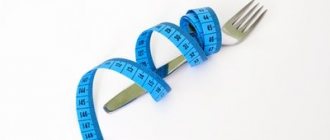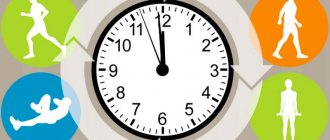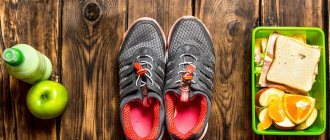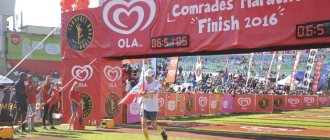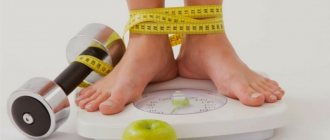Why you shouldn't run after eating
Bloating and discomfort appear in the abdomen
Digestion is a chemical and mechanical process. First, you chew, preferably slowly, to sufficiently chop the food, and at this time the necessary enzymes are already released in the stomach.
If you don’t have time to pause between meals and training, then most likely you eat quickly, without having time to chew thoroughly and without giving your gastrointestinal tract the opportunity to effectively digest food and absorb all the necessary substances. This results in bloating, constipation or indigestion. For some, this happens already during training.
The functioning of the gastrointestinal tract is disrupted
During running, blood flow accelerates - it rushes to the working muscles to deliver oxygen and nutrients to them. At the same time, it continues to saturate the internal organs as usual.
During meals, additional blood volume must flow to the gastrointestinal tract. And then it turns out that the muscles and the digestive system compete for their portion of blood.
By the way, there is a version that it is for this reason that cramps can occur - the muscles do not have enough nutrients, which should be supplied to the blood in time.
Stomach problems while running: why they occur and how to avoid them
The effect of training decreases
This point follows from the previous one. In normal life, supplying muscles accounts for 15-20% of the total blood volume in the body. During training, this figure increases several times. But if you ate a hearty meal and immediately went running, your muscles will not receive the required volume of blood along with oxygen and nutrients, which means they will not respond to the load.
Training plans for marathon and half marathon. and start preparing today.
As a result, the effect of the training will be lower than planned. Moreover, when you are full, insulin and serotonin are produced, which will put you into a relaxed, sleepy state.
Heartburn begins
After swallowing, food enters the esophagus, which is a kind of extension of the throat and connects it to the stomach. From the esophagus, food moves to the stomach, passing through the sphincter, which protects the esophagus from the entry of aggressive contents from the stomach.
When running, stomach acids can back up into the esophagus, causing heartburn and belching. The same thing happens if you bend over or do abs exercises after eating.
Why can't it be done immediately after eating?
First of all, you need to determine what harm running can cause to the body immediately after eating. First of all, running after eating will be quite difficult, since a person consumes on average about 1-1.5 kg of food, which can be equated to an additional load in the form of lifting a dumbbell.
In addition, running after eating will lead to a lack of blood , which is necessary both to supply the muscles during physical activity and to digest the food taken. When running, the body begins to spend additional resources on sufficient blood supply. As a result, you get tired quickly, and pain may appear in certain parts of the body.
The length of time it is advisable to wait after a meal depends on several factors, including the following:
- The amount of food that was consumed.
- Type of food taken.
- The presence of any discomfort in the digestive tract.
- Individual characteristics of the body.
Each person must independently determine the optimal period of time that he needs to start running after eating. On average, this time is 1-3 hours.
Food digestion time table
To make it easier to navigate, it’s worth dividing all products into:
- Easily digestible - fast carbohydrates that take up to an hour to digest: fruits, juices, berries.
- Moderately digestible - slow carbohydrates and vegetable fats, digested in 2-3 hours: vegetables, herbs, cereals, bread, cereals, pasta, bananas, dried fruits, milk, avocados.
- Difficult to digest - proteins and animal fats that take more than 3 hours to digest: meat, eggs, fish, seafood, legumes, nuts, seeds, hard cheese, mushrooms.
Sausages, canned food, alcohol, tea, coffee, fast food, baked goods made from white flour, sugar, candies, and chocolate are poorly digestible.
There is an opinion that breakfast is digested faster than lunch. But it is not exactly. Moreover, there are studies with the opposite result, convincing that metabolism accelerates only towards lunch.
What can you eat 30 minutes before training?
For an effective workout, the body needs energy, and it is best to get it from carbohydrates (about 70% of the portion before training), because they reduce fatigue and increase endurance. These should be foods with a low or medium glycemic index, that is, slow carbohydrates: durum wheat pasta, cereals, oatmeal, potatoes. You can add proteins to them and eat it all 1.5-2 hours before training.
If you don’t have that much time, then half an hour before training you should have a snack with carbohydrates with a high glycemic index, that is, foods that are quickly absorbed and provide the required amount of energy. The simplest options are a banana, fruit juice, muesli, toast with peanut butter or jam.
How long before a run should you eat?
You should not go for a run hungry, but also not on a full stomach. Exercising without first eating can lead to feeling unwell, dizzy, or even losing consciousness. In addition, this will have a bad effect on your running results.
Running with a full stomach is also unacceptable , as it can lead to poor digestion, decreased endurance, and heaviness in the stomach. The optimal solution in this case is a light snack half an hour or a full meal a couple of hours before training.
In fact, the indicated time for eating before a run is considered an average, with the food that was consumed playing an important role. It will take much longer to digest fatty foods than light foods.
But even
in this case, it is necessary to take into account the individual tolerance of the body to one or another type of food .
For example, an individual organism may spend much more time digesting protein than digesting carbohydrates, or vice versa.
You can consider the optimal time between eating and jogging in the case of consuming one or another type of food:
- If a person has eaten a banana, apple or honey, that is, fast carbohydrates, then jogging can begin 20 minutes after taking them.
- If the diet included baked goods or porridge, that is, slow carbohydrates, you will be able to run in 1-1.5 hours.
- When consuming protein foods, which include meat and dairy products, the time before jogging should be increased or even postponed for a while. The optimal time for jogging after eating protein is 2-3 hours.
- Fatty foods, which include canned food, lard, and fatty sour cream, are considered the most difficult to digest, so you can run at least 3 hours after eating it.
What to do if you didn’t have time to have a snack before training
First you need to remember what the task is before you and what kind of training it is. If the goal is to lose weight, and you have no more than 30 minutes to jog, then you can do it on an empty stomach. A number of studies confirm that light training on an empty stomach is more beneficial for burning fat tissue than training after eating. The main thing is, don’t forget about water - a glass “before” is a must.
If there is grueling running work ahead, a snack is necessary. Alternatively, it could be a small portion of some fruit, an energy bar, a couple of spoons of honey, sweet tea or coffee, a gainer, or a smoothie.
How long after eating should you run at different times of the day?
In the morning
Most often, beginners choose the morning for jogging. Although in reality it all depends on the individual characteristics of biorhythms.
Let's say right away that running on an empty stomach is not recommended , even if you are trying to lose weight.
After sleep, glycogen reserves are minimal, fats are broken down slowly. You may feel dizzy, weak, hungry, even faint! The productivity of such training is minimal.
How long after eating can you run in the morning?
If your breakfast consists of fast carbohydrates: bananas, oatmeal cookies, sweet juice, jam - you can go for a run in 30 minutes!
Are you used to a heartier breakfast of slow carbohydrates (oatmeal, pasta, whole grain bread, vegetables)? Then you will have to wait 1.5-2 hours before jogging.
At lunch
The lunch diet is often different from breakfast. Here we are used to eating proteins, fats, and slow carbohydrates.
Therefore, try to plan your workout no earlier than 2.5-3 hours later.
In the evening
The same dinner includes proteins + slow carbohydrates. It is advisable to run every 2-3 hours .
It is very important to take into account one more point - this is sleep. Running activates the nervous system, so it will be difficult to sleep well after training. Experts recommend running at least 2 hours before bedtime.
Therefore, the evening run should be halfway between dinner and bedtime, between which there should be 4-5 hours!
What foods should you avoid before training?
Fatty and fried
It will be hardest for you to run after a heavy meal of fatty food, because it takes a long time to digest and interferes with the absorption of proteins and carbohydrates. Eliminate fried, fatty meats and cheeses from your pre-workout menu. Do not go heavy on vegetable fats such as avocado and nuts, as they also take a long time to digest.
Spicy and salty
Spicy food really speeds up metabolism, but at the same time it increases sweating and causes heartburn. And salty absorbs water, thickens the blood and complicates the transport of oxygen to the muscles. Therefore, it is better to forget about sausages, sausages, smoked meats and salty snacks, by the way, and not only before training.
High-fiber legumes and vegetables
All this is very useful, but before training it can cause bloating and heaviness.
Fast food
You will fill your stomach with it, but you will not receive the nutrients necessary for training. If you really want it, treat yourself to it after your workout. But not often.
Store-bought sauces
Do not top up your pre-run meals with sauces and mayonnaise, as they are high in fat, sugar and flavorings, which is again nothing good for productivity.
Alcohol
Just in case, we remind you that alcoholic drinks are high in calories and lead to uncoordination of movements and dehydration.
The benefits of running in the evening
The main purpose of the workout is to improve health, increase endurance, and enhance fat burning - it is observed both in the morning and in the evening. Since all people are different in terms of psychological status, biological factors and night owls), everyone decides independently the question of the best time for sports. Any time of day has its advantages and disadvantages for running .
Benefits of evening classes:
- The most free organization of training. It is difficult for night owls to get up 1.5-2 hours earlier in the morning. Many simply do not want to deprive themselves of part of the night's rest. In addition, in the evening there is no need to keep track of time for fear of being late for work.
- According to scientists, at 18-20 hours the body is at the peak of vitality. The muscles are well warmed up, the joints are developed, the blood supply is in full force.
- It has been noticed that in the evening the human excretory system works more intensively, i.e. metabolism improves, toxins are eliminated from the body faster.
- After exercise, sleep improves. He becomes stronger and calmer. Many people who practice running in the evenings notice that less sleep is enough to fully recover.
- You can lose extra calories acquired during the day.
- The most important thing is that evening runs relieve stress, negative emotions, etc.
This training system has only 2 drawbacks:
- It's hard to force yourself to exercise after a long day at work. However, from the very first classes the runner will feel their necessity and usefulness.
- In the evening, the atmosphere of a large city worsens and is filled with harmful substances. To reduce their negative impact, it is better to choose places away from roads and enterprises: forest, park, square.
Conclusion: running in the evenings is useful, but to achieve the desired result, follow the necessary rules.
Simple rules for eating before running
- After a full meal, wait at least 1.5 hours.
- Do not eat fatty, fried, salty, spicy foods 4-5 hours before training.
- The pre-workout meal should consist of 2/3 slow carbohydrates and 1/3 protein.
- 15-30 minutes before training, you can eat fast carbohydrates in the form of a fruit smoothie, banana, or drink freshly squeezed juice.
- Drink water before and during your run if it lasts more than an hour.
Read on the topic: What to eat before starting a marathon and half-marathon Running on an empty stomach: is it possible to train on an empty stomach
How long after eating can you run?
The permissible period after which you can go for a run is equal to the time it takes the body to digest most of the food received, which means 60 - 120 minutes .
In reality, 1-2 hours is an average and much depends on the food that was consumed. The fattier the food, the more time the body needs to digest it, and vice versa. Individual tolerance to incoming substances also plays a role. For example, someone may metabolize protein faster or slower than another.
If there was a light snack, for example, a banana, then the absorption time is reduced to 30-60 minutes. Conversely, if a cutlet or chicken leg was eaten, then the digestion time can reach 3-4 hours.




